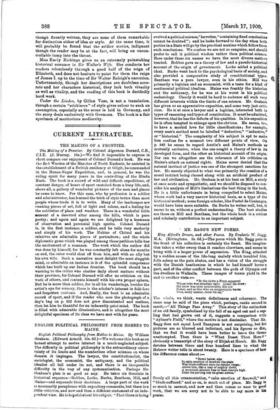ENGLISH POLITICAL PHILOSOPHY FROM HOBBES TO MAINE.
English Political Philosophy from Hobbes to Maine. By William Graham. (Edward Arnold. 10s. 6d.)—We welcome this book as an honest attempt to revive interest in a much-neglected subject. The difficulty in political philosophy is the extraordinary uncer- tainty of its limits and the numberless other sciences on whose domain it • impinges. The lawyer, the constitutionalist, the sociologist, the economist, the antiquary, and the political idealist all fall under its net, and there is an insuperable difficulty in the way of any systematisation. Perhaps Mr. Graham's plan is as good as any. He takes six theorists in historical sequence—Hobbes, Locke, Burke, Bentham, Mill, and Maine—and expounds their doctrines. A large part of the work is necessarily paraphrase with expository comments, but there is a little criticism, and now and then a diffident statement of an inde- reudent view. He is hopeful about his subject. "That there is being evolved a political science," he writes, "containing fixed conclusions cannot be doubted"; and he looks forward to the day when both parties in a State will go by the practical maxims which follow from such conclusions. We confess we are not so sanguine, and should prefer to call it political wisdom rather than political science. Here under these six names we have the most diverse matters treated. Hobbes gave us a theory of law and a pseudo-historical account of the origin of government. Locke added a political ideal. Burke went back to the psychological basis of society, and also provided a comparative study of constitutional types. Bentham was a pure lawyer, even in his ethics. Mill was primarily a logician and an economist, with a taste for a kind of sentimental political idealism. Maine was frankly the historian and the antiquary, for he was at his worst in his political eschatology. Clearly it would be hard to embrace all such very different interests within the limits of one science. Mr. Graham has given us an appreciative exposition, and some very just criti- cism. He is, at once a lawyer and a logician, interested both in types of reasoning and types of constitution. It must be admitted, however, that he has the defects of his qualities. In his exposition he is often tempted to enlarge upon the obvious. He seems, too, to have a morbid love for little classifications ; for example, every man's method must be labelled "deductive," " inductive," or " historical." The complexity of his subject is apt to make him confuse for a moment two different points of view. On p. 349 he seems to regard Austin's and Maine's methods as mutually exclusive, when the one sought a theory of law in its developed form, and the other an historical account of its origin. Nor can we altogether see the relevance of his criticism on Maine's attack on natural rights. Maine never denied that the natural instinct of justice was one of the strongest sanctions for law. He merely objected to what was primarily the creation of a moral instinct being classed along with an artificial product of law and civilisation. Mr. Graham is at his best on Mill, a study at once acute and sympathetic, and we should be disposed to con- sider his analysis of Mill's limitations the best thing in the book, He is a little unfortunate in being compelled to select Maine, whose work had a very narrow historical basis, as a type of the historical method ; some foreign scholar, like Fustel de Coulamges, would have been more suitable. On Burke he writes well, but, it seems to us, without a perfect understanding. The best studies are those on Mill and Bentham, but the whole book is a serious and scholarly contribution to an important subject.
































 Previous page
Previous page